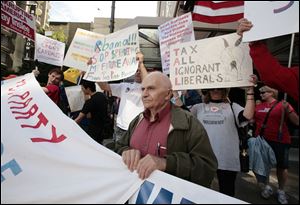
Tea Party bringing cash to 2012 U.S. elections
Established groups take reins, catch Tea Party anger
10/12/2011
Marsi Digiovanni, of SeaTac, with the Tea Party, joins others demonstrating Sept. 25 outside a fundraising event held by President Barack Obama in downtown Seattle.
WASHINGTON — Republican candidates in the 2012 U.S. elections will have a powerful weapon they lacked four years ago — heavy spending from groups aligned with the conservative Tea Party movement.
After a warm-up in 2010, when they spent tens of millions of dollars to help sway congressional races, supporters of the Tea Party movement aim to spend significantly more in their bid to defeat President Barack Obama and take control of the U.S. Senate in 2012.
The groups say they are merely helping a grassroots movement seeking a voice. Critics say they are exploiting individual Americans’ anger over economic troubles to promote a big business political agenda.
Americans for Prosperity, financed by the conservative billionaire brothers Charles and David Koch of oil and gas conglomerate Koch Industries, is among the groups that existed before the Tea Party wave took off in 2009.
“We by years anticipated the Tea Party movement,” said Americans for Prosperity (AFP) president Tim Phillips. “Folks look at that and go, I like the idea that it is long term and real infrastructure. Donors like that.”
AFP spent $40 million on 2010 races and plans to spend more than $100 million for the 2012 races, Phillips said.
The organizations spend the funds on activities from advertising to local bus tours and rallies that support issues dear to Republican hearts — cutting spending and curbing government.
The Tea Party has proven itself a major player in U.S. politics. Every leading Republican presidential candidate has addressed a Tea Party rally and embraced its platform of limited government and spending.
An August Gallup survey found that about a quarter of registered voters called themselves either backers or strong backers of the movement.
FreedomWorks, led by former House Majority Leader Dick Armey and supported by billionaire Steve Forbes, existed before the Tea Party but embraced it almost as soon as it started.
Like Americans for Prosperity, the conservative political committee plans to spend heavily on 2012, with a budget of more than $45 million after spending a fraction of that in 2010.
The Tea Party grew out of grassroots anger about the country’s economic problems, so it makes sense that conservatives would be best placed to take advantage of the movement, because Democrats are in charge, said Jeremy Mayer, a George Mason professor who studies social movements.
“There were large corporate interests that were very excited about turning the focus toward the right,” Mayer said. “The anger is not manufactured, but to a degree the direction” of it is.
Americans for Prosperity works with local Tea Party affiliates and has staff in more than 30 states who coordinate with regional Tea Party groups, Phillips said.
FreedomWorks is also beefing up its fund-raising muscle with a Super political action committee, or Super PAC. The new entity can take in unlimited funds thanks to recent court decisions.
For now, the group’s focus will be helping Republicans take the Senate but they do plan to get involved in the presidential race.
“We’ve been very critical of Mitt Romney — we’re hoping one of these other guys emerges as the conservative alternative,” FreedomWorks organizer Brendan Steinhauser said. “We plan to be on the ground in South Carolina and Florida,” important early primary states in the presidential race.
Another fundraising committee with Republican leanings, the Tea Party Express, is also bolstering its donor base. Now subject to federal $5,000 donation limits to candidates, the political action committee is forming an entity that lets it raise unlimited funds — without having to disclose donors.
Co-founder Sal Russo said the Tea Party Express, which spent $8 million in 2010, is on track to be “way ahead” of that pace in 2012.
Some contend the big organizations do not necessarily reflect the spirit of the Tea Party, with hundreds of local unaffiliated groups nationwide.
“The Tea Party is not a centralized organization controlled by one or two or three groups,” argues Republican strategist Christian Ferry, who worked on past presidential campaigns of Republican Senator John McCain.